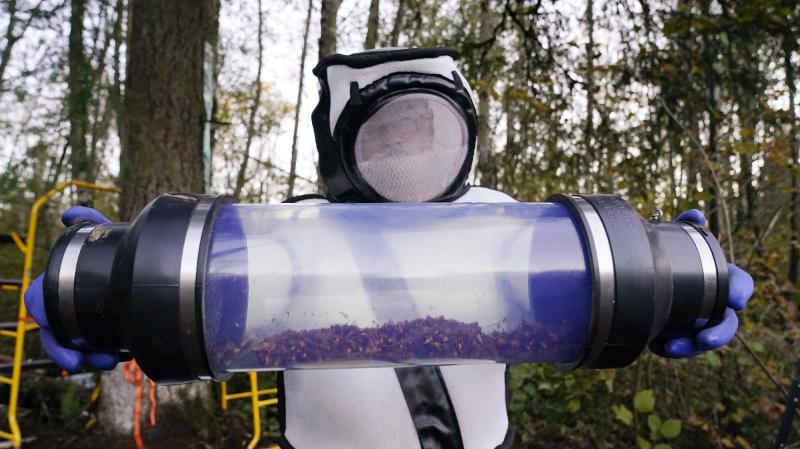Washington State Destroys The 1st 'Murder Hornet' Nest Of The Season : NPR
By: NPR. org


The stuff of real nightmares.

August 27, 20219:45 AM ET
The Associated Press
 Enlarge this image
Enlarge this image
Sven Spichiger, Washington state Department of Agriculture managing entomologist, displays a canister of Asian giant hornets vacuumed from a nest in a tree behind him in Blaine, Wash., last year. State officials said this week they had destroyed the first Asian giant hornet nest of the season, which was located near the town of Blaine. Elaine Thompson/AP hide caption
Elaine Thompson/AP
Sven Spichiger, Washington state Department of Agriculture managing entomologist, displays a canister of Asian giant hornets vacuumed from a nest in a tree behind him in Blaine, Wash., last year. State officials said this week they had destroyed the first Asian giant hornet nest of the season, which was located near the town of Blaine.
Elaine Thompson/AP
SPOKANE, Wash. — Officials in Washington state said Thursday they had destroyed the first Asian giant hornet nest of the season, which was located near the town of Blaine along the Canadian border.
The Washington state Department of Agriculture said it eradicated the nest Wednesday.
The nest was located in the base of a dead alder tree in rural Whatcom County, about 2 miles (3 kilometers) from a nest the agency eradicated last October and about one-quarter mile from where a resident reported a live sighting of an Asian giant hornet on Aug. 11. The site is about one-quarter mile from the Canadian border.
The Asian giant hornets are sometimes called murder hornets because they prey on other bees.

Science
1st Live Asian Giant 'Murder Hornet' Of 2021 Spotted In Washington State
The hornet is an invasive species to North America
Asian giant hornets are the world's largest hornet and are not native to North America. They prey on honey bees and other insects. They can conduct mass attacks on honey bee hives, destroying the hive in a matter of hours. The hornets were first detected in the United States in 2019 when a hornet was reported in Whatcom County.
The 2-inch-long (5-centimeter-long) invasive insects pose a threat to honeybees and native hornet species. While not particularly aggressive toward humans, their sting is extremely painful and repeated stings, though rare, can kill.
State workers in protective clothing began the eradication Wednesday by vacuuming 113 worker hornets from the nest. Then the team began removing bark and decayed wood near the base of the alder tree. Removing the wood revealed that the hornets had excavated the interior of the tree to make room for the nest, which consisted of nine layers of comb.
The portion of the tree with the nest was cut and transported to Washington State University Extension in Bellingham for further analysis. The nest itself had nearly 1,500 hornets in various stages of development.
"While we are glad to have found and eradicated this nest so early in the season, this detection proves how important public reporting continues to be," said Sven Spichiger, WSDA managing entomologist. "We expect there are more nests out there and, like this one, we hope to find them before they can produce new queens."

 Article is LOCKED by moderator [Split Personality]
Article is LOCKED by moderator [Split Personality]






No need for politics, thanks
Besides the fact that these hornets scare the hell out of me, I am really concerned about our honey bees, which are still having a problem. What happens if we can't stop them?
Apply a flame thrower to every diseased Alder tree?
Probably like with the Killer Bees, we still haven't been able to stop them. And they are a very big danger to our honey bees.
Anoon Raven.. freezing winters over there does not kill them??
Need them at the moment like a hole in the head...😖😖
Oh heck no. I have a hard enough time with bugs. 2-inch hornets?
How come that forest isn’t on fire?
Glad those critters don't like the hot dry weather where I live. The only invasive bees we have to worry about down here are the Africanized honey bees.